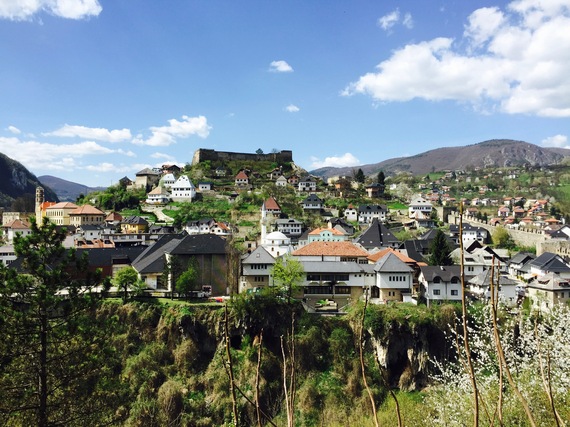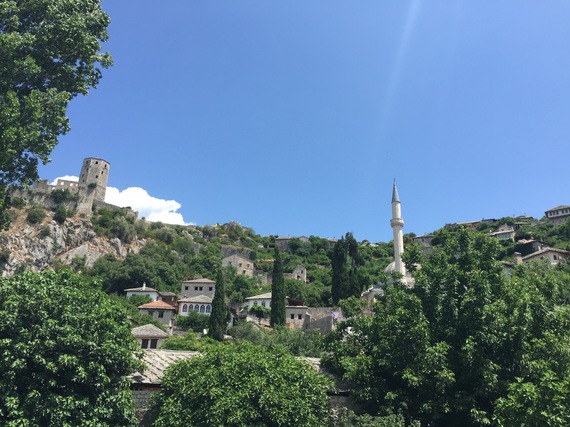The experience of Bosnian Islam
- Published in
- Category: LATEST NEWS
There is one Islamic saying, which goes like this: “You should not think that if You fail to give the heart to others that You would gain it for yourself.” When someone would ask me what is the most special thing about Islam in Bosnia, the simplest answer would be taken out of this saying - it is Islam of sharing. Recently I was asked by local tourist agency to present the experience of “Bosnian Islam” to a group of Americans who visited Bosnia in organization of NYT “Times Journeys” and I shared with them my insights exactly about the “Islam of sharing”.
“Sharing” is one of the main characteristics of what we call the Bosnian experience of living Islam. Islam came to Balkans some 6 centuries ago, even though some traces suggest that earlier contacts existed with Muslim travellers and merchants. Current Islamic tradition in the lands of Balkan mainly traces its origins to Ottomans. It survived until today despite historical disturbances and turmoil that the region of Balkans went through. Bosniaks - Muslims of Bosnia and Herzegovina belong to this tradition of sharing. And this tradition of sharing is maintained by specific circumstances: historic, political and economic - which enabled this tradition to keep Islam live in the heart of Europe.

Jajce: the medieval Bosnian town, photo: M. Kovač)
One might ask what sharing has to do with this? But, just a casual walk through the streets of Bosnia during the daytime in Ramadan would give a lot of answers. Many around are fasting, but a visitor will hardly notice that. Similarly, a visitor to Bosnia will find many that are not observing the fast. We say that in Bosnia it is more important to fast in the name of God, and for those who do not observe it, we hope and pray for God’s Mercy. The focus here, especially during Ramadan, is to give alms to the poor, to host Iftar meal for family and relatives, even though some are not religious and not fasting at all. However, the most important thing is to be happy and joyous. As renowned Bosnian theologian professor Enes Karic said:
“God and all what is His is not there for humanity to cry!”
As one might notice, this is a very secular outlook and image of living Islam. The fact that someone is guest is very important in Bosnia everyone can sense the hospitality of local people. The tradition of “honoring the guest” is among the most important pillars of practical faith of Muslims in Bosnia, which had been always the land of refuge and shelter for centuries.
Islamic identity of Bosnian Muslims is based and designed in the tradition of Hanafi school of Islamic Jurisprudence. It belongs to so-called “Turskih cultural zone of Islam” with Bosnian specificities. Hanafi madhab is considered as “most agile legal school” in Islam. According to Grand Mufti Husein Kavazovic, who is religious authority and the head of Bosnian Muslims, this school had traditionally formed the institutions of religion and religious practice of Bosnian Muslims.
“Bosnian Muslims had always cultivated an open, cheerful and tolerant vision of world and life, while at the same time were adamant in respecting fundamental religious teachings of Islam. They adopted many cultural forms and practical expressions of religion from Ottoman Turks. In that way, Tasawwuf or Sufism that is very important element of “Turkish cultural zone of Islam” quickly gained its followers and adherents of spiritual path of love here. At the same time Bosnian Muslims retained their pre-Islamic Bosnian customs that were not in conflict with principles and values of Islam and incorporated some elements of the Bosnian style in the universal form and practice of Islam. A clear example of this integration is the original architectural style of the Bosnian mosques. Also, one of the important cultural and social peculiarities of Islamic life in Bosnia and Herzegovina is that Bosniaks did not accept the practice of polygamy and marriages between close relatives which is the common among Muslims in the Middle East and North Africa,” explains Grand Mufti Kavazovic.
He adds that in classical Islamic tradition of Bosniaks “Islamic life represents the unity of ideals and reality, doing good and encouraging good, and following good side of life.” For him as the highest religious authority of Bosnian Muslims:
“Islam is represented in religious truths, institutions and rituals, but also everything that is good and beautiful. Good Muslim is good father, son, brother, neighbour, a responsible man and worker, or on female side: good Muslim is good mother, daughter, sister, a woman who is responsible for her work.”
This tradition and experience of Bosnian Islam - the tradition of sharing - today is very much endangered by the argument of might rather than by the power of right. All know what happened in Bosnia 20 years ago as many witness today that many things here are just stalled. There is hope among many open-minded people in Bosnia that American and European friends would not leave this country alone as it was left two decades ago and experienced genocide. But, is this hope reliable?

(Počitelj, the town on the south in Herzegovina region, photo: M. Kovač)
Many would ask why is it Islam in Bosnia that is different from what we see in other parts of the world. Well, it is not different. First of all, Islam is rather defined as a worldview than as a common concept, which many call “religion”. It is everyday practice to confuse Islam with Muslism -Islam is one thing, its interpretation and application is another. The good advice to everyone who want to learn about Islam is not to confuse these two important concepts. As Sufis like to say:
“The nature of Islam is like water. Water doesn’t have color but it enables it, it doesn’t have smell but it enables it, it doesn’t have taste but by its very quality as such enables everything to have smell, to have color, to have taste...” The same is with Islam in Bosnia. It is like water, which adapted to the time and place and is of Bosnian color, Bosnian smell and Bosnian taste.
Some would rather dismiss this idealized story. But, in reality the adherents of Islam here went through all problems of Europe together with their Christian and Jewish co-citizens. And this was much easier thanks to the insistence of their faith which commands sharing goods and wrongs of the time with others. The latest attempt to break this tradition of sharing occurred some 20 years ago with the horrors of war. By the Grace of Lord this people managed to preserve it against all odds and difficulties of this troubled region.
Also, there is one important institution that developed and somehow saved Islam in Bosnia. It is now called “Islamic Community”. A Westerner would compare this institution with the church in his country of origin, but it is not similar. When in 1878. Austro-Hungarian Empire annexed Bosnia and Herzegovina, after the Congress in Berlin, Muslims in Bosnia were detached from the rest of Ummah or worldwide Muslim Community. They felt like left behind. In order to resolve the crisis Austro-Hungarian Empire pushed for creation of an independent institution that will guide and administer Islamic religious practice in Bosnia and Herzegovina (1882). Some years after that The Empire even opened institutions of high learning for scholars of Islam, that is now Faculty of Islamic Studies in Sarajevo.
Even though these institutions were created to separate Bosnian Muslims from the rest of Muslim world, the outcome was very positive, which we see today. “Islamic Community” somehow helped Muslims of Bosnia to establish themselves within the context of wider social, political and economic circumstances of the region. Majority accepted the destiny to be subjects of European Christian Empire rather than to immigrate to remaining Islamic Empire. Today’s “Islamic Community” has its structure with assembly, central authority, local authorities, schools, colleges, Islamic faculties, etc.
Unfortunately, not just in the West (Europe and America), but also in the East (Muslim World), there is no institution of this type. In my opinion, because of that, Islam is being thought and preached exclusively by those designated by the State, or by those who do not accept that on freelance basis. Traditional scholars of Islam today almost do not exist. If this can be the case for secularization of Muslim world I think this would be the strongest argument. The need for separation between state and Islam is existential. Why?
I thing that current context gives only two illiberal solutions for Islam: to be under the State control and, by such, biased and mere tool of power or to be under no one’s control and, by such, open to all kinds of deviation. In Bosnia, the change of empires from Islamic Ottoman to Austro-Hungarian Catholic caused great shock but also demanded for intellectual and civilizational dialogue and adaptation. In terms of religion, the key development was creation of this unique religious organization that still enlightens Bosnian Muslim lifes with the idea of sharing their destiny and land with their fellow Christians, Jews, agnostics and all other citizens. Immensely important aspect of Islamic Community is that it is according to law and in the context of secular state fully independent and autonomous organization.
Islam teaches, and Bosnian experience proves, that our heart is made for sharing the life with others because we share the clay from which we all came and to which we will return once again. We share the belief in God who created us from a single soul then scattered us like seeds into countless human beings. We share the air we breathe and the rise of the Sun we see every dawn. We believe that ours is the time of the Ethics of Sharing that should lead this country to brighter future and all humanity from the time of death camps, the gulags, Fascism, Anti-Semitism, the Holocaust, Islamophobia, Ethnic Cleansing and Genocide towards a decent life, freedom, justice, human rights, democracy and prosperity for all.
